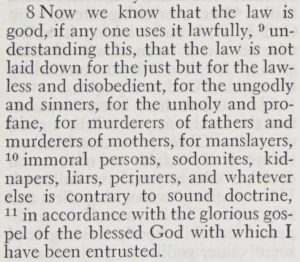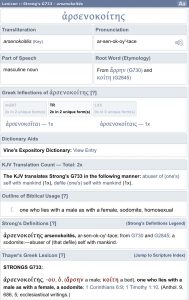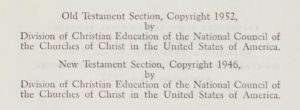It is absolutely insane to die on this hill.
—Becket Cook—
Key point: Don’t be deceived. Despite emotional rhetoric and an appealing emotional presentation that is sure to be showcased in the film 1946, God’s Word is clear. It tells us that homosexuality — all forms of it — are sinful. Even so, Christ offers forgiveness of sins and eternal life to all who trust Him for salvation. Everyone, whether guilty of homosexuality or not, stands in need of that forgiveness.
All the articles in this series are available on this page. Note: With the title of this series, we are not necessarily saying that the people working to produce 1946 are intentionally trying to mislead people; it could be that they are deceived themselves.
~~~~~~~~~~~~~~~~~~~~~~~~~~~~~~
A movie titled 1946 is in the works that will advance some amazing ideas. The title of the documentary is 1946 because 1946 was the year the New Testament portion of the Revised Standard Version (RSV) of the Bible — the first modern-language English Bible — was published.

The Revised Standard Version of the complete Bible was released in 1952. With the publication of the RSV New Testament in 1946, the word homosexuals appeared for the first time in an English Bible.
In the King James Version of the Bible, 1 Corinthians 6:9-11 says this:
9 Know ye not that the unrighteous shall not inherit the kingdom of God? Be not deceived: neither fornicators, nor idolaters, nor adulterers, nor effeminate, nor abusers of themselves with mankind,
10 Nor thieves, nor covetous, nor drunkards, nor revilers, nor extortioners, shall inherit the kingdom of God.
11 And such were some of you: but ye are washed, but ye are sanctified, but ye are justified in the name of the Lord Jesus, and by the Spirit of our God.
A Mistranslation?
The message of the movie, and consequently the narrative those involved in producing 1946 wish to advance, is this: The word homosexuality is a modern word. When the translators of the Revised Standard Version of the Bible translated 1 Corinthians 6:9, they took the Greek words that previously had been translated in the King James Version (KJV) as
-
-
- “effeminate” (μαλακός, transliteration: malakos) and
- “abusers of themselves with mankind” (ἀρσενοκοίτης, transliteration: arsenokoitēs)
-
and rendered them “homosexuals.” This, claims the documentary, was a mistranslation that ignited an anti-gay movement in the church, and even in the culture.
The movie 1946 will advance the idea that putting the English word homosexuals in the Bible ignited an anti-gay movement in the church, and even in the culture.
Background
Let’s first consider this background information. The RSV was translated this way:
1 Corinthians 6:9 Do you not know that the unrighteous will not inherit the kingdom of God? Do not be deceived; neither the immoral, nor idolaters, nor adulterers, nor homosexuals,j 10 nor thieves, nor the greedy, nor drunkards, nor revilers, nor robbers will inherit the kingdom of God. 11 And such were some of you. But you were washed, you were sanctified, you were justified in the name of the Lord Jesus Christ and in the Spirit of our God.


You will notice that there is a footnote by the word homosexuals. The footnote said, “jTwo Greek words are rendered by this expression.” These words were malakos (translated as “effeminate” in the KJV), and arsenokoitēs (translated as “abusers of themselves with mankind” in the KJV).
Arsenokoitēs appears in one other place in the New Testament, in 1 Timothy `1:10. Here is 1 Timothy 1:8-11 in the KJV.
1 Timothy 1:8 But we know that the law is good, if a man use it lawfully;
9 Knowing this, that the law is not made for a righteous man, but for the lawless and disobedient, for the ungodly and for sinners, for unholy and profane, for murderers of fathers and murderers of mothers, for manslayers,
10 For whoremongers, for them that defile themselves with mankind, for menstealers, for liars, for perjured persons, and if there be any other thing that is contrary to sound doctrine;
11 According to the glorious gospel of the blessed God, which was committed to my trust.
Here’s how the translators of the Revised Standard Version rendered these verses in 1946:
8 Now we know that the law is good, if any one uses it lawfully, 9understanding this, that the law is not laid down for the just but for the lawless and disobedient, for the ungodly and sinners, for the ungodly and sinners, for the unholy and profane, for murderers of fathers and murderers of mothers, for manslayers, 10 immoral persons, sodomites, kidnapers, liars, perjurers, and whatever else is contrary to sound doctrine, 11 in accordance with the glorious gospel of the blessed God with which I have been entrusted.

Malakos (translated as “effeminate” in 1 Corinthians 6:9 in the KJV) appears in the New Testament in two other verses: Matthew 11:8 and Luke 7:25. In both instances the term is translated soft in the KJV. In part 2, we’ll explore the significance of this Greek word.
A Mistranslation that Ignited an Anti-Gay Movement?
According to the upcoming film, the narrative, those working on the film, and an important player who will be a central figure in it, using the term homosexuals instead of “those who practice homosexual vices” or something similar in 1 Corinthians 6:9 was not only an erroneous translation, but one that “led to a biblical mistranslation of catastrophic proportions” (see this video at 57:45) This is quite a claim, and there are solid reasons to reject it completely. Even so, the website for the movie declares,
In the RSV’s translation of 1 Corinthians 6:9, the word “homosexual” was used in lieu of the Greek words “malakoi” and “arsenokoitai.” Researchers agree today these words translate loosely to “effeminacy,” and “pervert,” or “sexual pervert.” The decision to use the word “homosexual” instead of the accurate translations was voted on by the RSV committee. 1946 explores how this mistranslation ignited the anti-gay movement within American conservative Christians.
Watch the trailer for 1946 (embedded below) carefully. In it, you’ll encounter, among others working on the film, two researchers named Ed Oxford and Kathy Baldock.

As the trailer unfolds, Ed and Kathy tell a story that is very important for us to unpack. You can watch the trailer and read its manuscript on this page, or you can simply watch it here.
~~~~~~~~~~~~~~~~~~~~~~
Since the publication of this article, the above trailer has been replaced.
Here is the new trailer:
~~~~~~~~~~~~~~~~~~~~~~
One gets the impression from the trailer that the researchers and others who are working on this film honestly believe that the discovery of a letter written sixty years ago that challenged the RSV committee’s rendering of 1 Corinthians 6:9 to include homosexuals in the list of those who would not inherit the kingdom of God (and in particular, the word homosexuals) — as well as the subsequent discovery that the author of the letter is still alive and can tell his story — constitute proof that the committee mistranslated 1 Corinthians 6:9, and that their mistranslation of that verse is the primary, and perhaps even the only, platform the Christian church has had for believing that homosexuality is a sin.
If impressions turn out to be true — and everything I’ve seen about the film reinforces the impressions the trailer engenders — this documentary will be propped up by
-
-
- extremely sloppy research, but sadly, also by
- emotional rhetoric that will certainly mislead and deceive.
-

After all, the trailer is titled: “1946: The Mistranslation that Shifted a Culture,” and it states that “There are 45,000 evangelical churches in the United States, [and] they still believe being LGBTQ+ is a sin.”

The apparent claim of the film 1946 is going to be that the word homosexuals in 1 Corinthians 6:9 in the RSV is a mistranslation that ignited the Christian church’s belief that homosexuality is a sin.
All this, the film apparently will further contend, started in 1946. Before then, says the apparent narrative, the church was blissfully unaware that homosexuality was sinful and wrong. Why? It had no basis for believing it was wrong! Had it not been for that pesky mistranslation of 1 Corinthians 6:9 that, without sufficient justification, added homosexuals to Paul’s list of those who will not inherit God’s kingdom, the church would know, as it had previously known for centuries, that homosexuality isn’t a sin.
This narrative is false, and even glaringly false. This is dishonesty on an extreme level. However, as we already have indicated, even though the arguments made are, and will be, as unreliable and as unstable as quicksand, the emotional appeal of the film will be strong and will win hearts.

Let’s get ready to refute the case that the film `1946 will present.
The Meaning of the Term Transliterated Arsenokoitēs
To understand what is happening here, we first need to realize that the film’s producers and researchers stake their arguments on the idea that homosexuality itself isn’t sinful but that Paul was condemning only abusive homosexual relationships, or even sexual perversions generally. Committed homosexual relationships, they clearly believe, are neither abusive nor sinful — and that’s why Paul used a word that the translators of the KJV rendered “abusers of themselves with mankind.” While this English translation is not inaccurate, it does leave room for someone to claim that not all homosexual activity is abusive — if the English phrase in the KJV is the only consideration of the one making the claim. Yet, as we will see, in various places in both the Old Testament and the New Testament, the Bible condemns homosexuality as sinful because it violates God’s law and His intentions for humanity. In other words, homosexuality itself is inherently abusive.
Though not inaccurate, as we have said, the KJV’s translation of arsenokoitēs in 1 Corinthians 6:9 — abusers of themselves with mankind — is not literal in the strictest sense. Arsenokoitēs is a term likely coined by Paul himself. It is a combination of two Greek words —

Significantly, when Paul used terms for men and women in Romans 1:27, (also go here), he chose “the Greek words that most emphasize biology: arsenes [males] and theleias [females]. Both words are rarely used in the New Testament; when they do appear, they appear in verses meant to emphasize the sex of the subject, as in a male child (arsenes).”1 It is this word (arsenes / arrēn) that Paul combined with the Greek word for bed (koitē) to form arsenokoitēs. Thus, the term literally means “men in bed together,” a clear reference to — yes — homosexuality.

Joe Dallas writes, “The two words combined, as Paul used them, put ‘male’ and ‘bed’ together in a sexual sense, with no hint of prostitution [or any other form of abuse or departure from a committed, consensual, same-sex relationship necessarily] involved.”2 It is clear that while Paul’s term includes what Ed Oxford and Kathy Baldock would call “abusive homosexual relationships,” the term does not hone in on those exclusively. The apostle was referring to all homosexuals in all kinds of homosexual relationships. Historian Alvin Schmidt says this: “Christian abhorrence of homosexuality was not confined to pederasty…. Sex between two males also was considered abhorrent. For instance, St. Paul condemned men’s ‘indecent acts with other men’ (Romans 1:27). He did not differentiate between pedophilia and adult homosexual acts; both were sinful perversions in God’s eyes.”3
Study the Words Themselves
Therefore, the very word that Ed Oxford and Kathy Baldock believe should be narrowly interpreted actually has a broad meaning. To discover what the Bible teaches, we must uncover what its words mean, and consequently what they say. To do that, of course, we have to study the words themselves. Yes, understanding the culture and practices of the day are important. In fact, in this case, they are especially significant and noteworthy, because
Corinth was a large and splendid commercial city, with Greek roots and a Roman overlay in the first century. Its population was perhaps 500,000. Because of its location at the Corinthian isthmus, it benefited from both land and sea routes. Corinth, rather than Athens, was chosen as the Roman capital of Achaia. Like all large cities of the Roman Empire, Corinth was both very religious (with a number of pagan temples) and very immoral (with the worship of Aphrodite sanctioning religious prostitution).4

The city
was known for its moral corruption. There was actually a word coined in Greek which translated was “to behave like a Corinthian” which meant immorality and drunken debauchery. In 1 Cor. 6:9-10, Paul listed the typical lifestyle in Corinth—pornography, idolatry, homosexuality, stealing, drunkenness, swindling, and sexual sin of every kind.
It was against this backdrop that Paul wrote his letters to the Corinthian Church, letters that included the statements we find in 1 Corinthians 6:9-11. In this context, let us not overlook the good news we find in verse 11, and its practical implications: “11 And such were some of you: but ye are washed, but ye are sanctified, but ye are justified in the name of the Lord Jesus, and by the Spirit of our God.” Being “in Christ” and living the Christian life means leaving sin behind and living as “new creature” because “old things are passed away; behold, all things are become new.” Paul wrote that to the Corinthian Christians, too.
“Such were some of you,” declares 1 Corinthians 6:11. Being “in Christ” and living the Christian life means leaving sin behind and living as “new creature” because “old things are passed away; behold, all things are become new” (see 2 Cor. 5:17).
There is much more to consider, but for now we will take a break. Next time we’ll dive into the meaning of the term malakos (translated as “effeminate” in the KJV). We’ll also examine some additional Bible passages and what they tell us about God’s design — not just for humanity, but for individuals as well.
I leave you with Becket Cook’s remarks about 1946 that include the quote we cited at the top of this post: “It is absolutely insane to die on this hill.” Mr. Cook explains why, and he makes a great deal of sense.

Copyright © 2022 by B. Nathaniel Sullivan. All rights reserved.
top image credit: Photo by Kelly Sikkema on Unsplash
Copyright notice for the RSV Bible, 1952:

Notes:
1Joe Dallas, “Understanding Pro-Gay Theology,” in The Complete Christian Guide to Understanding Homosexuality: A Biblical and Compassionate Response to Same-Sex Attraction, Joe Dallas and Nancy Heche, General Editors, (Eugene, Oregon: Harvest House Publishers, 2010), 131.
2Joe Dallas, 137.
3Alvin J. Schmidt, How Christianity Changed the World, (Grand Rapids: Zondervan, 2004), 88.
4Kendell H. Easley, Holman QuickSourceTM Guide to Understanding the Bible, (Nashville: Holman Reference, 2002), 282.

[…] https://wordfoundations.com/2022/09/22/1946-part-1/ […]